Femia > Health Library > Pregnancy > Pregnancy health > Which food can cause miscarriage: A comprehensive guide
Which food can cause miscarriage: A comprehensive guide
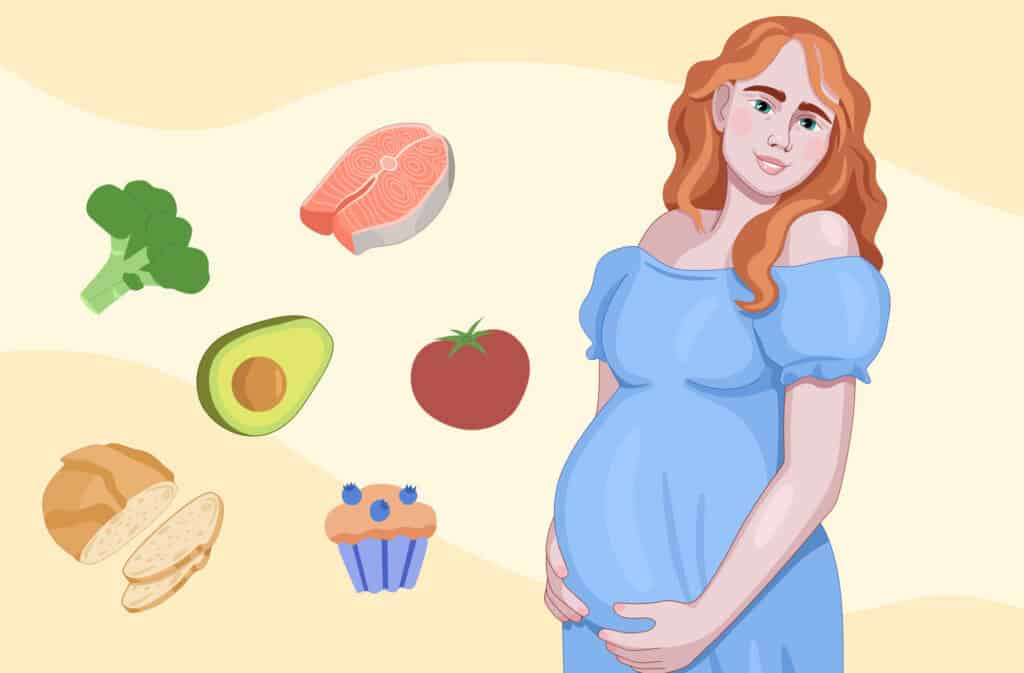
- Updated Feb 11, 2025
- Published
CRAFTED BY HUMAN
Crafted by human At Femia, we provide accurate and up-to-date information at every stage of your journey, from trying to conceive, pregnancy and postnatal support. All content is created by a real person based on in-depth research and own professional experience. Femia ensures that you will receive expert advice, strict accuracy and a personalized approach from our authors/medical experts. Learn more about our editorial policy.
FACT CHECKED
Fact checked At Femia Health, we maintain the highest standards of editorial excellence in delivering content focused on helping you conceive, guiding you through pregnancy, and supporting you postpartum. Explore our content review principles to learn how we ensure the accuracy and quality of our health and lifestyle tips for every stage of your journey.

Created with Hector Chapa, MD, FACOG, Clinical associate professor, Obstetrics and Gynecology Texas A&M University, College of Medicine in Bryan-College Station, USA
Most foods and drinks are considered safe during pregnancy if consumed measurably and cooked well. Some foods to avoid during pregnancy include liver and liver products; game meats; pâté; deli meat; raw or undercooked meat, poultry, fish, seafood, and eggs; unpasteurized milk and dairy products; and mold-ripened soft cheeses unless thoroughly cooked.
Both before conception and during pregnancy, women often need to adjust their diets to ensure they receive essential nutrients that support their health and the baby’s development. Daily nutrition plays a crucial role in female fertility and overall health, directly impacting the baby’s well-being.
A balanced intake of fruits, vegetables, whole grains, lean protein, and healthy fats forms the foundation of a healthy pregnancy diet. However, there are additional limitations compared to a general diet, as certain foods can pose risks to the fetus.
Understanding foods to avoid during pregnancy can help minimize potential risks. In this guide, we’ll address common dietary concerns and outline what foods to avoid to support a healthy pregnancy journey. Using a pregnancy weight gain calculator can also aid in tracking weight gain while following these guidelines.
How does a mother’s diet affect pregnancy?
While nutrition generally plays an important role in every person’s life for a healthy and energetic life, women’s nutritional requirements change drastically before conception, during pregnancy, and later, during breastfeeding. At these times, females are facing nutritional vulnerability at its greatest. Adjusting to these changing nutritional requirements is fundamental for the well-being of both mothers-to-be and their babies.
👉 Find out more: First trimester pregnancy diet: 1 to 3-month pregnancy diet chart and meal plans
When planning to conceive, a healthy diet can help create sufficient nutrient reserves for pregnancy. Then, once you have become pregnant (as well as during breastfeeding) your body’s need for energy and nutrients increases. During these times, suboptimal food intake core elements, such as iron, calcium, iodine, zinc, and folate, can cause the following challenges:
- Anemia;
- Pre-eclampsia;
- Hemorrhage;
- Low birth weight;
- Developmental delays in babies.
Being conscious about your diet during pregnancy can help prevent many potential complications and health risks. This not only applies to foods you should eat, but also foods you shouldn’t. Beyond the limitations of a general healthy diet, there are some foods that carry increased risk during pregnancy and should be consumed with caution.
designed just for you
Personalized meal plans, symptom tracking, and more with the Femia
Rare but potential dietary-induced causes of miscarriage
Miscarriage is the sudden loss of a pregnancy that takes place before the 20th week. It affects roughly 10% to 20% of known pregnancies. However, it may also happen very early, before people learn they’re pregnant.
Although this may sound distressing, there are many factors in your control that can reduce the risk of miscarriage. These include:
- Regular prenatal care;
- Avoidance of substances that increase miscarriage risk, such as alcohol, drugs, and nicotine;
- Limited caffeine intake (under 200 milligrams per day);
- Consistent multivitamin intake.
Your diet is another important factor in the risk of miscarriage, and there are two main causes to be conscious of.
👉Find out more: Your pregnancy checklist: Week-by-week guide to preparing for baby
Vitamin deficiency
Lack of certain nutrients and vitamins can increase the risk of miscarriage.
The first pivotal element is folate. Its low levels have been shown to put females at a higher risk of spontaneous pregnancy loss. Hence, folic acid supplementation is important before conception and during pregnancy. It lowers the risks of neural tube defects (NTDs), fetal structural anomalies, preterm, birth, and miscarriage.
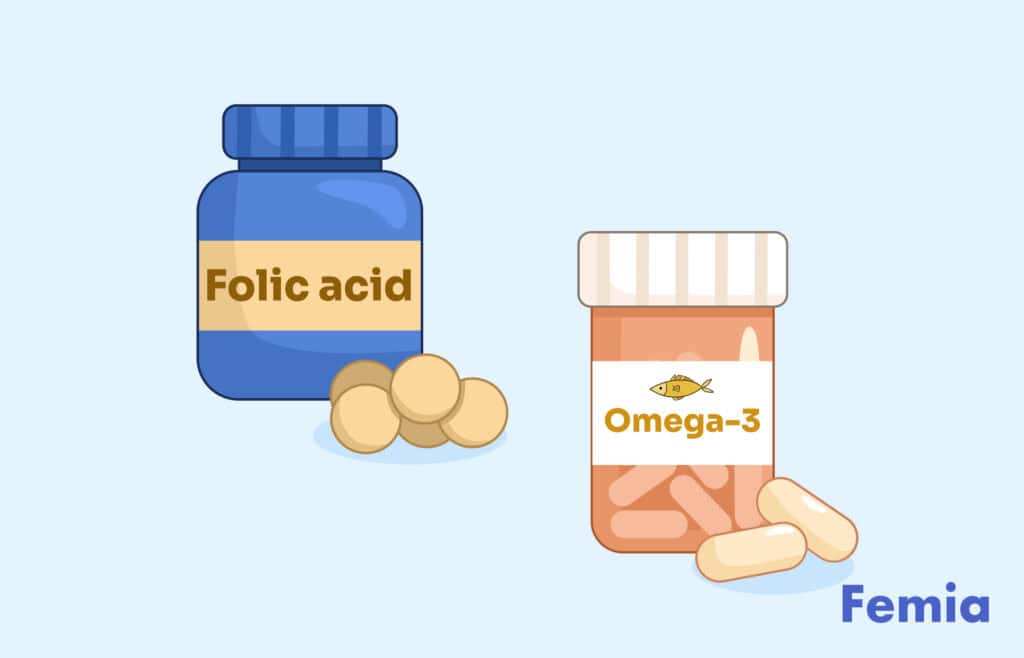
Another crucial vitamin is B6. Its deficiency has been linked to a higher likelihood of miscarriage and preterm birth.
Apart from these two elements, women who are pregnant or trying to become pregnant should also be aware of deficiencies in the following elements:
- Biotin
- Calcium
- Choline
- Chromium
- Magnesium
- Selenium
- Beta carotene
- Phosphorus
- Vitamin B12
- Vitamin C
- Vitamin D
- Vitamin E
- Vitamin K
Food poisoning
In general, food poisoning is rarely serious or linked to significant health consequences. It might be accompanied by symptoms like nausea, diarrhea, stomach cramps, vomiting, and other digestion issues that typically ease within a week. However, during pregnancy, severe food poisoning can increase the risk of miscarriage.
Some bacteria and parasites that can cause dangerous poisoning include:
- Listeria. Listeriosis is about 20 times more likely to occur in pregnant females than in other healthy adults. It may lead to low birth weight, meningitis, and septicemia, as well as miscarriage or stillbirth. The primary risk foods include ready-to-eat meat products, deli meat, cold-smoked fishery products, and unpasteurized dairy products like milk, ice cream, and soft cheeses.
- Toxoplasma gondii. This parasite causes a condition called toxoplasmosis. During pregnancy, it can cause birth defects, miscarriage, and pass to a baby. The risk food is undercooked or raw meat. It is also possible to get infected through cat feces.
- Salmonella. Salmonella bacteria cause salmonellosis—a rather common disease that impacts the human intestinal tract. In most healthy adults, it’s not too serious. However, it might cause dangerous complications in some people, including pregnant women. The risk food includes poorly cooked or raw eggs.
Which food can cause miscarriage?
With a balanced and nutritious diet, vitamin supplementation, and thorough prenatal care, the risks of miscarriage and other complications can be significantly lowered. However, there are certain groups of products that might increase these risks.
If you are wondering what food causes miscarriage, here’s a detailed overview of product groups and specific foods that you might want to be careful with or avoid completely.
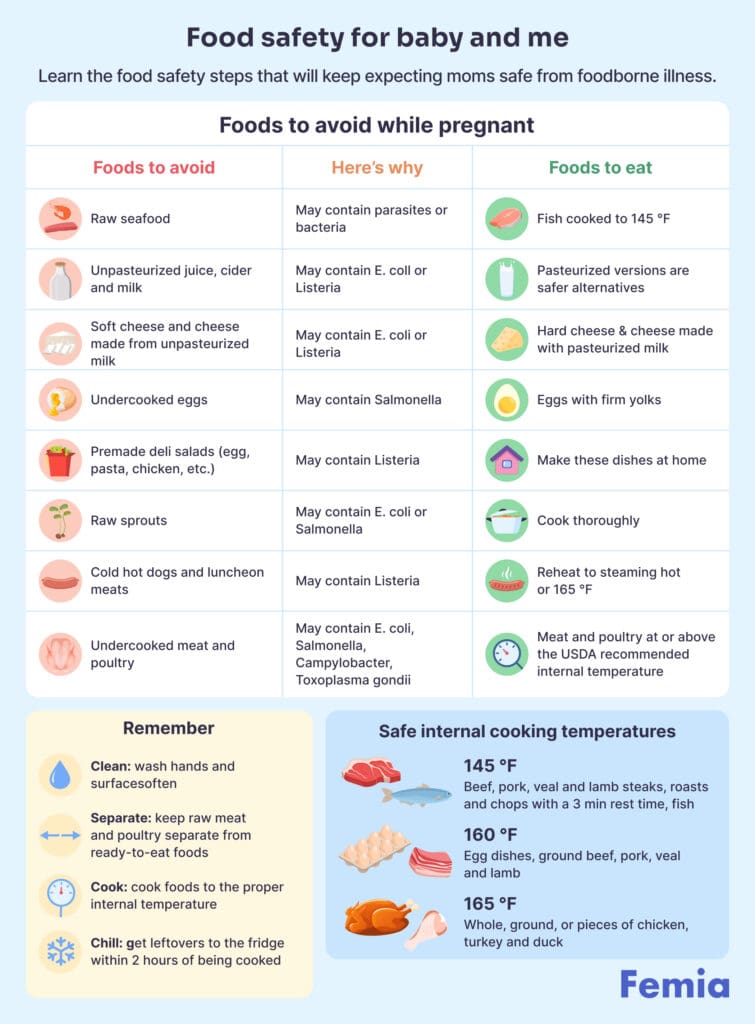
(Source: foodsafety.gov)
Meat and poultry
Both meat and poultry are valuable elements of a healthy diet. They are rich in protein and provide your body with crucial elements like iron, iodine, zinc, and vitamin B12. Together, these elements stimulate growth and development, which are crucial for a healthy fetus. However, not all meat and poultry products are safe during pregnancy.
Some meat and poultry products might be infected with toxoplasma gondii, which creates a risk of getting toxoplasmosis. Game meats may contain lead shot, and animal liver contains excess levels of vitamin A, which may also be harmful to a fetus.
What to avoid during pregnancy:
- Liver and all liver products;
- Game meats (e.g. pheasant, partridge, or goose);
- All types of pâté;
- Raw or undercooked meat.
You may also want to be careful with cold-cured meats, such as pepperoni, salami, prosciutto, and others. These are not cooked and may also be contaminated with parasites, so it’s recommended to steer clear from them unless you heat/cook them thoroughly.
There are also considerations about deli meat. Cold cuts are cooked and pasteurized, and they are required by the federal government to be sprayed with a food additive that helps prevent listeria. So, the likelihood of being infected with listeria from deli meat is rather rare, which makes some people wonder, why can’t pregnant women eat deli meat?
The problem is that mothers-to-be are typically more vulnerable to listeria complications, so even a small chance of getting infected is disturbing. Hence, it’s believed that the safest course is to completely avoid deli meat during pregnancy. According to the American College of Obstetricians and Gynecologists (ACOG), pregnant women should avoid cold cuts, deli meats, and luncheon meats unless they are heated to an internal temperature of 165°F (74°C) or steaming hot.
Now, what about other meats and poultry? Let’s say, can you eat chicken salad while pregnant? Or, can you eat bacon while pregnant? In most cases, the answer is “yes,” as long as your meat and poultry foods meet the three core recommendations: they are fresh, stored correctly, and cooked well.
In most cases, you can safely enjoy chicken salad, bacon, sausage, and other meat and poultry products as long as you cook them until they’re steaming hot to kill off bacteria. However, you may want to avoid ordering dubious meals in restaurants when you don’t know how well meat or poultry will be cooked.
Eggs
Salmonella contamination in eggs is rare, but if it causes food poisoning, it may increase the chance of pregnancy complications and miscarriage in cases of severe infection.
What to avoid:
- Raw or poorly cooked chicken eggs;
- Raw or poorly cooked goose, duck, or quail eggs.
You can still eat eggs during pregnancy as long as their whites and yolks are cooked well. You can also enjoy egg-based products like mayonnaise. If you want to eat raw or partially cooked eggs, the safest option is to choose British Lion hen eggs, which are laid by hens vaccinated against salmonella.
Fish and seafood
Generally, eating fish during pregnancy is good, as it’s an excellent source of protein, iron, and zinc—crucial for fetus growth—and omega-3 fatty acids, which are important for brain development. However, some types of fish and seafood might be risky and should either be avoided or limited.
You may want to eat oily fish in limited amounts, because it can contain pollutants like polychlorinated biphenyls. Raw shellfish is known for containing toxins, viruses, and harmful bacteria, which can lead to food poisoning. Cured or ready-to-eat cold-smoked fish is not cooked, which means it can contain listeria bacteria, which causes listeriosis and can increase the chances of miscarriage. Also, some fish are high in mercury, which can lead to various health problems.
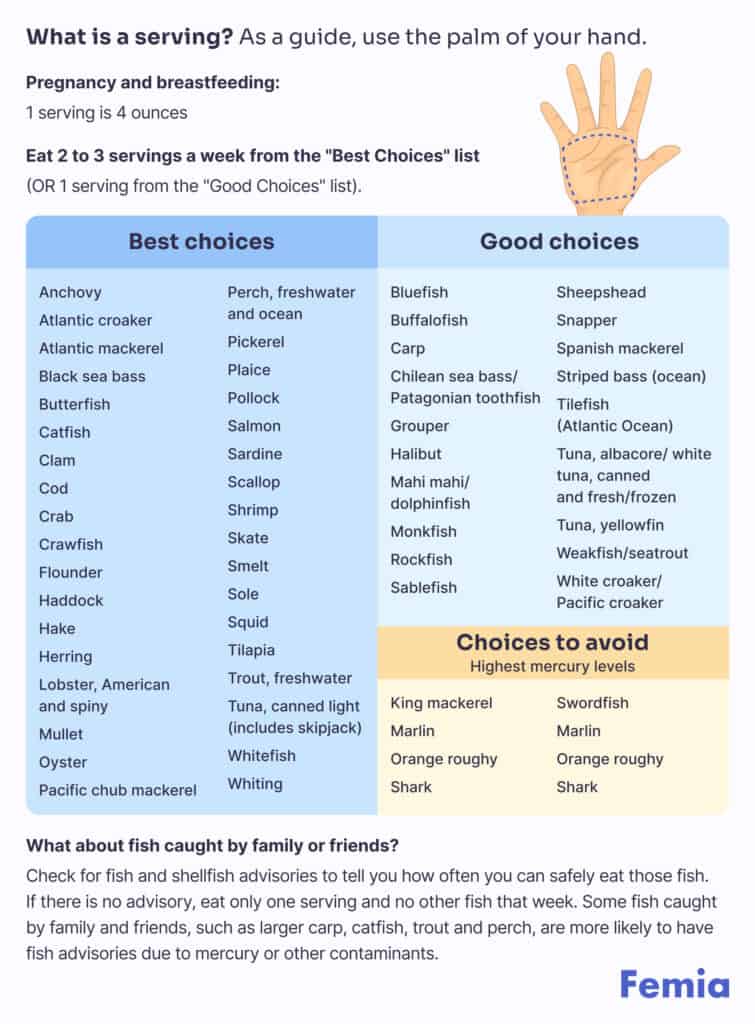
(Source: FDA)
What to avoid:
- Swordfish;
- Shark;
- Marlin;
- Raw shellfish, including crab, mussels, prawns, and others;
- Cold-smoked or cured fish.
The good news is that you still can enjoy your favorite fish and seafood with some safety considerations. Let’s quickly address popular concerns:
Can you eat crab while pregnant? Yes. Crab contains many important nutrients—such as vitamin B12, folate, niacin, iron, zinc, and selenium—and it’s also relatively low in mercury. As long as it’s thoroughly cooked and you eat it moderately (2–3 times a week, not exceeding 12 ounces per week), it can be safe.
Can you eat shrimp while pregnant? Yes. Shrimp is rich in protein but low in fat and mercury, which makes them a healthy choice for mothers-to-be. To be safe, shrimp should be cooked well, and their consumption should also be moderate, which is considered no more than 2–3 times or 8–12 ounces per week (this is a general rule for shellfish).
Can pregnant women eat smoked salmon? Salmon provides you with protein, omega-3 fatty acids, and vitamin D, which makes it a good addition to a healthy pregnancy diet. However, eating raw and undercooked fish (including cold-smoked salmon) can lead to several viral, bacterial, and parasitic infections, which might be harmful to your pregnancy. Hence, you should avoid eating cold-smoked salmon and other undercooked fish unless it’s cooked and heated to 165℉. Also, it’s recommended to limit the consumption of oily fish (i.e. salmon, mackerel, and herring) to two portions per week.
designed just for you
Personalized meal plans, symptom tracking, and more with the Femia
Dairy products
Dairy foods foster your unborn baby’s growth and supply it with protein, calcium, and vitamin D. However, there is a small chance that unpasteurized or soft-ripened products may contain listeria bacteria. There are also concerns about soft, mold-ripened cheeses—their mold coating or inner content typically has a lot of moisture that supports the growth of bacteria.
What to avoid:
- Unpasteurized dairy, such as milk, yogurt, and ice cream;
- Mold-ripened soft cheeses, both white (e.g. camembert or brie) and blue (e.g. gorgonzola or Roquefort).
Pasteurized dairy products are safe to consume. This includes milk and other milk-based products, such as ice cream, yogurt, cream, etc. As for cheeses, you can eat hard cheeses, like cheddar or parmesan, both pasteurized or unpasteurized. Semi-hard cheeses, like edam, or soft cheeses (no mold or coating), like mozzarella or cottage cheese, should be pasteurized.
But, what if you really crave mold-ripened soft cheeses? Can you eat blue cheese while pregnant? Or, let’s say, have a bit of brie? You can still enjoy them under one condition: they should be cooked until steaming hot to kill bacteria.
👉 Find out more: Weird pregnancy cravings: The strangest food combos and how to handle them
The same is true for other cheese types. Let’s say your concern is can you have goat cheese while pregnant? The answer is “yes,” as long as it’s hard, pasteurized, or thoroughly cooked.
Other things to avoid in early pregnancy and beyond
The thorough guide presented above should help you gain a better understanding of which food could be problematic in pregnancy, and hence, should be avoided. Still, we know that there are many other questions and concerns women might have regarding their diets if they are pregnant or planning to conceive.
Let’s quickly review other dietary considerations that can help you ensure optimal health for you and your baby:
- Alcohol has to be eliminated completely during pregnancy, as it can cause long-term harm to your baby.
- Caffeine is safe to consume if it doesn’t exceed 200 milligrams per day. It’s important to fit all caffeine-infused products into this limit, including coffee, tea, soda, chocolate, etc.
- Licorice root is recommended to be excluded from your diet, as it’s linked to higher blood pressure and can potentially cause preterm delivery. However, liquorice candy is safe. Licorice candy contains glycyrrhizin, which can affect hormone levels if consumed in large amounts, but small quantities are generally considered safe for pregnant women.
- Herbal teas (and herbs in general) can be safe. However, some diet, cleansing, and detox teas, as well as specific herbs like black cohosh, blue cohosh, and dong quai, might be harmful to pregnant women and their babies.
- Peanuts are sometimes recommended during pregnancy to help prevent peanut allergy in infants.
Fruits and vegetables are generally good for pregnant women. They should be washed thoroughly to prevent contamination issues. However, questions about certain exotic fruits aren’t rare. For example, a rather common question among mothers-to-be is can you eat pineapple while pregnant? The truth is that there is no conclusive evidence that pineapples or other fruits can harm you if eaten fresh and consumed moderately. Incorporating insights from a pregnancy symptoms tracking app can help you monitor your nutrition and avoid foods that may increase the risk of miscarriage, ensuring a healthier diet for you and your baby.
Questions from the Femia community
Are all types of fish unsafe to eat during pregnancy?
No, fish can provide you with a wealth of important nutrients that will support you and your baby’s health. However, high-mercury fish like shark, swordfish, and king mackerel are recommended to avoid. Safer fish options that you can include in your diet include salmon, tilapia, and cod.
Can I eat sushi while pregnant if it doesn’t contain raw fish?
Yes, sushi made with thoroughly cooked fish or vegetarian ingredients is generally safe. However, you might want to be cautious about cross-contamination. If eating sushi from a restaurant or store, it’s important to ensure that it was cooked in a clean environment.
Is it safe to drink herbal teas during pregnancy?
Some herbal teas are safe and even beneficial as their components, such as ginger or red raspberry leaf, might help reduce pregnancy symptoms. However, some may contain unrecommended or potentially harmful ingredients. It’s a good idea to consult with a healthcare provider before consuming any herbal teas.
What should I do if I accidentally eat something I should have avoided?
If you eat something that should be avoided, it’s important to monitor your health for any unusual or adverse effects. There is no need to panic right away, because one-time exposures to unrecommended foods are most often not harmful. However, it’s always a good idea to consult with your healthcare provider and get personalized advice.
How can I ensure I’m getting enough nutrients if I have to avoid certain foods?
Focus on balance, and develop a comprehensive and varied diet rich in safe, nutrient-dense foods. Regular consumption of prenatal vitamins can also help fill any nutritional gaps and optimize your health. Talk to your healthcare provider or a nutritionist for personalized guidance.
👉 Find out more: First trimester pregnancy diet: 1 to 3-month pregnancy diet chart and meal plans
The bottom line
Proper nutrition is what helps your body have enough resources to support the baby’s growth and development, which is why taking a healthy approach to your diet is important during pregnancy. While many foods that we consider healthy (including meat, poultry, fish, eggs, and dairy) can be good for you and your baby, there are some foods to avoid during pregnancy.
Food items which are not recommended mainly consist of poorly cooked or raw animal products and byproducts. Being aware of and avoiding them in your diet can help ensure a healthy pregnancy and reduce the risk of complications, including miscarriage.
Consider using the advice from this guide to eat properly during pregnancy, and don’t hesitate to consult with your healthcare provider to receive personalized guidance.
References
- “Maternal nutrition. Preventing malnutrition in pregnant and breastfeeding women.” UNICEF. https://www.unicef.org/nutrition/maternal#:~:text=During%20pregnancy%2C%20poor%20diets%20lacking,and%20developmental%20delays%20for%20children.
- “Miscarriage.” Mayo Clinic, 8, Sept. 2023. https://www.mayoclinic.org/diseases-conditions/pregnancy-loss-miscarriage/symptoms-causes/syc-20354298#:~:text=Overview,people%20realize%20they%27re%20pregnant.
- George L, Mills JL, Johansson ALV, et al. “Plasma Folate Levels and Risk of Spontaneous Abortion.” JAMA, 2002. https://jamanetwork.com/journals/jama/fullarticle/195414.
- Mary J. Brown, Muhammad Atif Ameer, Sharon F. Daley, Kevin Beier. “Vitamin B6 Deficiency.” National Library of Medicine, 8, Aug. 2023. https://www.ncbi.nlm.nih.gov/books/NBK470579/.
- “Food poisoning.” The National Health Service (NHS), 18, Jun. 2021. https://www.nhs.uk/conditions/food-poisoning/.
- “Listeriosis.” World Health Organization, 20, Feb. 2018. https://www.who.int/news-room/fact-sheets/detail/listeriosis.
- “Toxoplasmosis.” Mayo Clinic, 3, Nov. 2022. https://www.mayoclinic.org/diseases-conditions/toxoplasmosis/symptoms-causes/syc-20356249.
- “Salmonella infection.” Mayo Clinic, 29, Apr. 2022. https://www.mayoclinic.org/diseases-conditions/salmonella/symptoms-causes/syc-20355329.
- “Meat, Poultry & Seafood – Food Safety for Moms to Be.” U.S. Food & Drug Administration, 27, Sept. 2018. https://www.fda.gov/food/people-risk-foodborne-illness/meat-poultry-seafood-food-safety-moms-be.
- “Deli Meat in Pregnancy.” American Pregnancy Association. https://americanpregnancy.org/healthy-pregnancy/is-it-safe/deli-meats/.
- “Eggs and salmonella.” Egg Info. https://www.egginfo.co.uk/eggs-safety/salmonella#:~:text=Eggs%20and%20salmonella,of%20the%20British%20Lion%20scheme.
- “Pregnancy and fish: What’s safe to eat?” Mayo Clinic, 10, Aug. 2023. https://www.mayoclinic.org/healthy-lifestyle/pregnancy-week-by-week/in-depth/pregnancy-and-fish/art-20044185#:~:text=Seafood%2C%20which%20includes%20fish%20and,with%20your%20baby%27s%20brain%20development.
- “Eating Shrimp During Pregnancy.” American Pregnancy Association. https://americanpregnancy.org/healthy-pregnancy/is-it-safe/eating-shrimp-pregnancy/.
- Abrams EM, Sicherer SH. “Maternal peanut consumption and risk of peanut allergy in childhood.” CMAJ, 9, Jul. 2018. https://www.ncbi.nlm.nih.gov/pmc/articles/PMC6041250/.
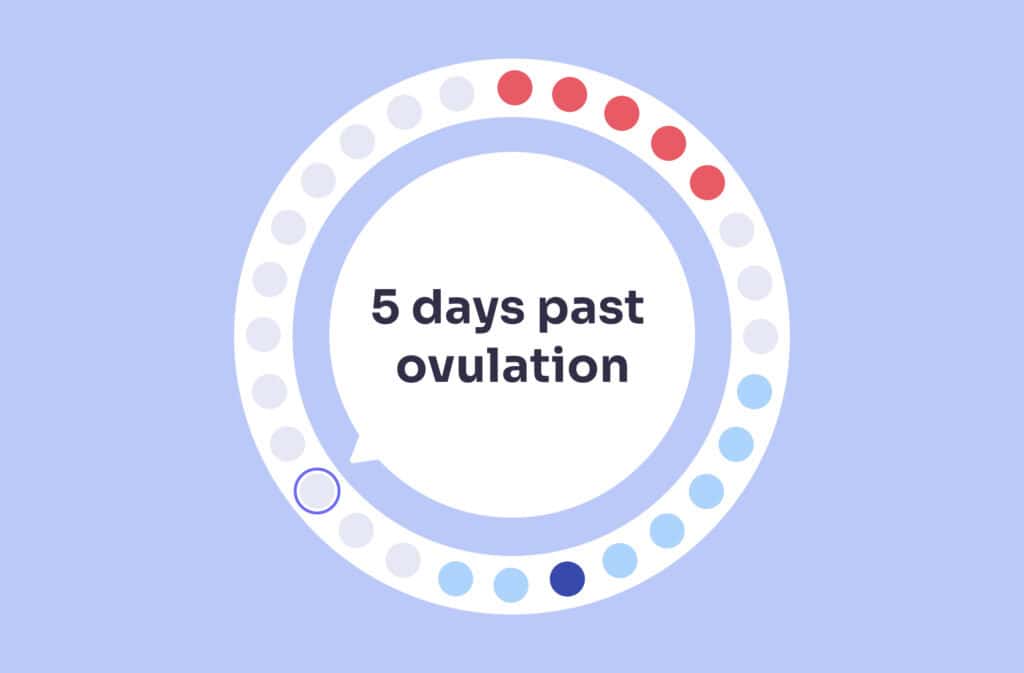
Discover the symptoms at 5 days past ovulation (5 DPO), signs of pregnancy, and find out why it’s still too early for accurate pregnancy test results. Expert advice from Femia.
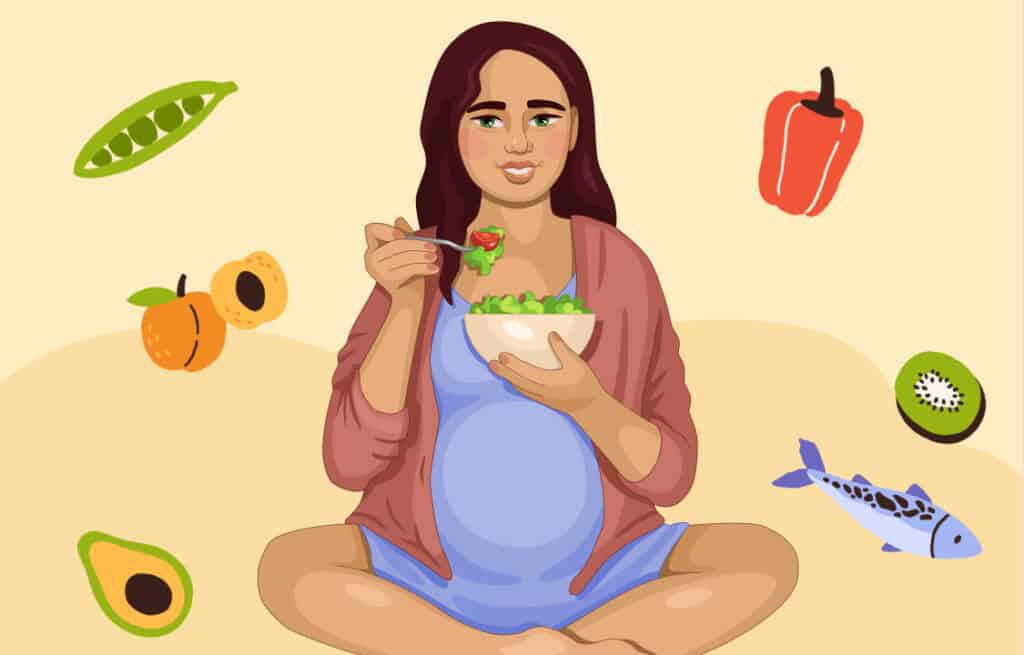
Learn how to manage your gestational diabetes with this 7–day meal plan. Enjoy balanced meals and snacks designed to keep your blood sugar stable and support a healthy pregnancy.
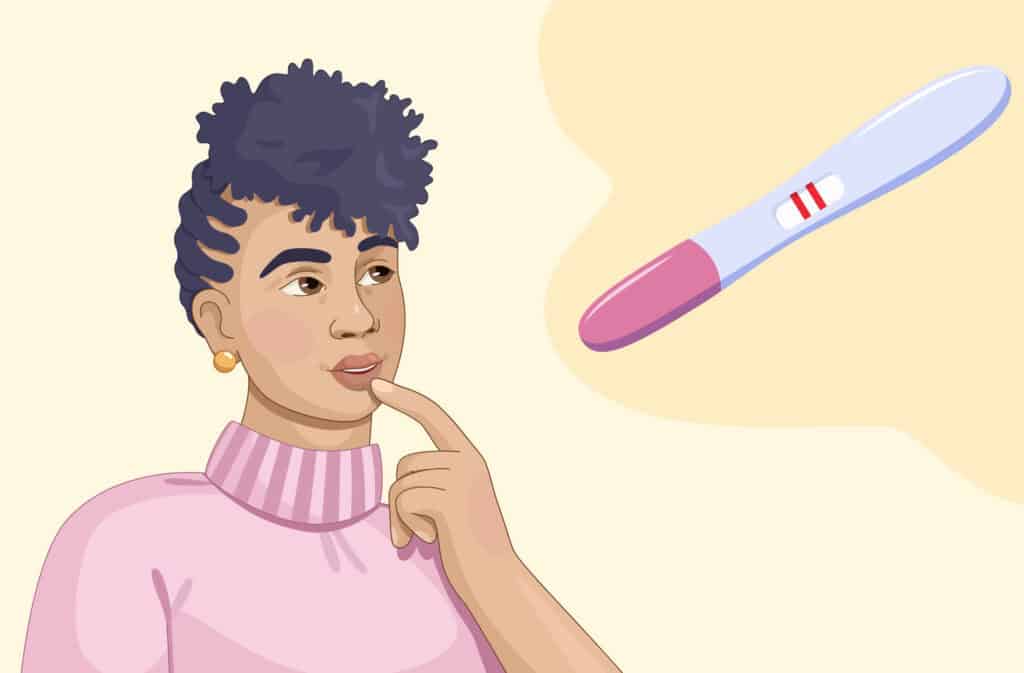
Explore getting pregnant at 40 and learn everything about fertility treatments and pregnancy at 40. Discover expert tips to optimize fertility and navigate age-related challenges.
